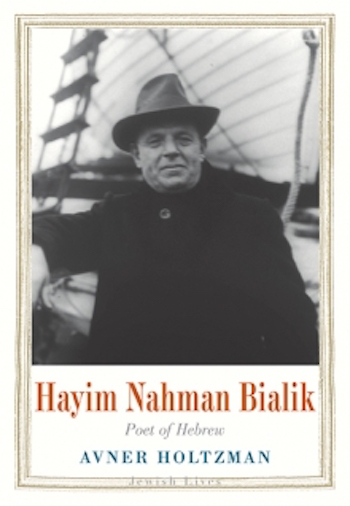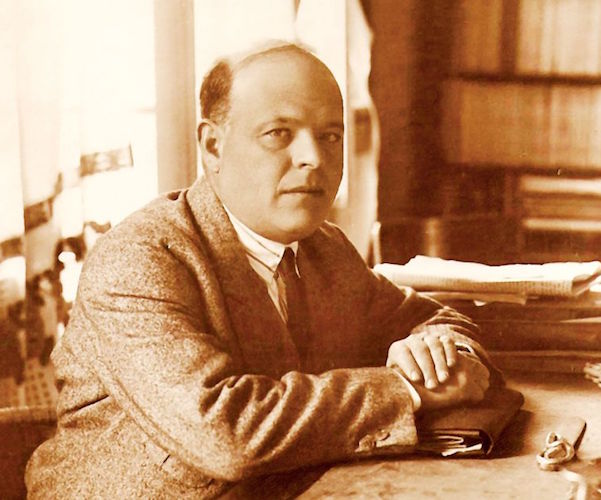Book Review: Hebrew Poet Hayim Nahman Bialik — Not the Whole Story
We learn a great deal about Hayim Nahman Bialik’s life in this ably researched biography. But the volume does not live up to its subtitle.
Hayim Nahman Bialik: Poet of Hebrew by Avner Holtzman. Translated from the Hebrew by Orr Scharf. Yale University Press, 250 pages, $25.
By Joann Green Breuer

Avner Holtzman’s new biography of poet, essayist, storyteller, and editor Hayim Nahman Bialik (January 9 1873-July 16 1934) is less a critical assessment of his literary works than a careful chronology of his turbulent life. The poems and prose to which Holtzman refers — and from which he occasionally quotes (all in translations in the English edition) — are inevitably linked to Bialik’s personal distress, which was often heightened by contemporary political developments. For Bialik, unlike many other lyric poets, this particular keyhole is a fair, though obviously incomplete, way in which to become acquainted with his verses.
Still, because the volume’s chapters (translated by Orr Scharf) offer none of Bialik’s original Hebrew, any analysis of poetic form and function is bound to be suspect, no matter how linguistically and metaphorically parallel the translation may be. Also, while hunting for biographical references in Bialik’s poetry is understandable, they necessarily remain surmises, no matter how well substantiated. Holtzman does a fervent job of substantiation; and it must be admitted that Bialik’s numerous torments give the biographer good reason to take this approach. A tantalizing question that Holtzman raises, and leaves for the reader to contemplate, is how Bialik became celebrated as the ‘National Poet of Israel,’ and whether such an appellation is creditable for anyone anywhere.
Hayim (variously transliterated Chaim/Hayyim/Chayyim) was born in the area of Zhitomer, an intellectual, literary, and religious center of 19th century Russia. His parents were not of that august coterie. His father was initially a timber merchant, then a bankrupt tavern owner. Bialik’s earliest childhood experience was of hills and trees, which he idealized as a ‘sacred childhood’ in his adult writings. His father died when Bialik was seven years old. His mother, poor and burdened, left the young Bialik with her wealthy father-in-law to raise. Bialik was tutored in the Jewish culture of Torah, Mishnah, and Talmud, at which he excelled. Jewish law, traditions, and tales, excited his impressive mind; occasional encounters with physical punishment married pleasure with pain. Despite his love of learning, Bialik remained haunted throughout his life by a sense that his parents had abandoned him. The rich scholarly life offered by his grandfather — of which Bialik took considerable advantage — was insufficient compensation. Holtzman argues that this primal pain is the seed for much of Bialik’s art, contradictory passions, and peripatetic footfall.
Near the close of the 19th century, a passionate struggle between Halacha (traditional Jewish law) and Haskala (Enlightenment) enlivened and alienated many European Jews, including the adolescent Bialik. Remaining loyally ‘in the tent of Torah’ clashed with curiosity about worldly temptation; the Yeshiva (traditional Jewish schooling) as ‘cradle and prison’ conflicted with the ambitious political/literary vision offered by Zionism. Bialik’s emotional and philosophical contradictions and contortions over these issues are visible his first published essay, 1891’s “The Vision of a Zionist Settlement,” and in his poignant early poem, “To the Bird.”
Yehoshua Hana Ravnitski was Bialik’s first editor and publisher (he helped found the Devir publishing house in Berlin in 1922. In 1924, it moved to Tel Aviv). Ravnitski’s faith in Bialik drove the the latter to write as much as he did, given that his faith in himself and his talents were both intermittent. Bialik’s mentor was Ahad Ha’am, a Hebrew essayist who envisioned a cultural Zionism along the lines of Theodore Herzl’s articulation of a political Zionism. Bialik completed this aspiring trio, taking on the role of the poet of aesthetic Zionism. For these three it was not a ‘heritage without shackles,’ as David Ben Gurion had dreamt. Bialik contemplated the existence of a “collective Jewish experience,” and struggled with how best, within that contemporary experience, to engage in a “dialogue with the Jewish canon.” This conflict, in Holtzman’s sensible view, is Bialik’s existential dilemma.
Bialik’s arranged marriage to Manya Averbach began with instanteous mutual love, or lust. Yet he spent many months throughout his marriage in isolation from her, occasionally with mistresses. She was forbearing about his infidelity, perhaps even understanding. Bialik could not settle down, domestically or professionally. He would cease composing poems for years at a time. He did not stay in one city for long. He taught in Warsaw, where he was literary editor of SHILOAH. His decade in Odessa was a prodigious one, where he began his Book of Legends, to which he added tales and fragments all his life. He met Shalom Aleichem, with shared admiration. Yet works like “Mantle of Grief,” which contain descriptions of himself as an “empty shell,” reflect his shaky self regard.
As World War One and the Ottoman Empire ended, Bialik found himself ignored at the major Vienna conference where the Balfour Declaration was codified. He ending up staying at a resort in Kiev, devoting himself to Hebrew literature. A decade sojourn in Tel Aviv followed, where, as an author and co-founder of the Israeli version of the Dvir press, he became a respected and admired figure. Nonetheless, his poem ‘My Soul Bows Down,’ with its proclamation that he is ‘just another Jew,’ betray his continued insecurities. Bialk sailed to the United States for five months of speechifying for Zionist causes, but left with wrenching questions: What is the role of a Jewish Palestine in a secular world? Where does Yiddish stand in relation to Hebrew? What is the role of a private poet of whom pubic responsibility is demanded? What is required of Jews: moderation or radical action? After another affair, Bialik left Israel for a series of lectures in Eastern Europe; he promoted Hebrew, Zionism, and traditional Jewish sources, all the while witnessing and warning of Nazism and burgeoning anti-semitism.

Poet, essayist, storyteller, and editor Hayim Nahman Bialik.
Bialik’s final years were darkened by chronic illness exacerbated by a political/philosophical clash over the nature of the not yet established Jewish state. He and fellow moderate Chayim Weitzmann (who ended up being ousted from the presidency of the World Zionist Organization) battled with the more radical beliefs of Ze’ev Zabotinsky and his allies. In Bialik’s mind, the question of the nature of a Jewish state remained unresolved. Ironically, this uncertainty energized Bialik into a flurry of creativity that was both questioning and nostalgic. His “Orphanhood” cycle and “Predah’”(Farewell) evoke his heartache for the timber lands of his childhood, even while he revived and expanded his Book of Legends and composed a number of poems that suggested his enduring inner turmoil.
Bialik remained in Europe for medical treatments yet, despite a diminished reputation in Jewish Palestine, his 60th birthday was celebrated as a national holiday there, as well as in the Jewish communities in many countries. His final poem, “Third Generation,” was in honour of Tel Aviv’s residents. His funeral procession was along its streets and there he is buried.
Holtzman has devised a clear and concise biography. To his credit he does not indulge in pseudo-academic flim flam or poetical fomenting. The chronology addendum is a useful reference. And the questions the biographer raises about the reality — and the nature — of what might designate and constitute a ‘national poet’ are well worth thoughtful consideration. Wisely, he leaves it to the reader to propose answers.
But: is every poem truly, let alone only, best seen as a unique expression of a biographical reference? And, even if it is, does that illuminate the nature of the poem? The arts of poetry are other, if not more, than fact or feeling about that fact: they are about matters of sound, word choice, where the line ends and/or slides. Particularly in Hebrew poetry, references to Biblical and other classical texts add significantly to the reader’s appreciation of texture, tone, and meaning. We learn a great deal about Bialik’s life in this ably researched biography. But the volume does not live up to its subtitle: ‘Poet of Hebrew.’ For that we need the Hebrew, and a touch of biographical humility: ‘a poem should not mean, but be.’
Joann Green Breuer is artistic associate of the Vineyard Playhouse.
Tagged: Avner Holtzman, Hayim Nahman Bialik, Hebrew Poetry, Jewish Lives
